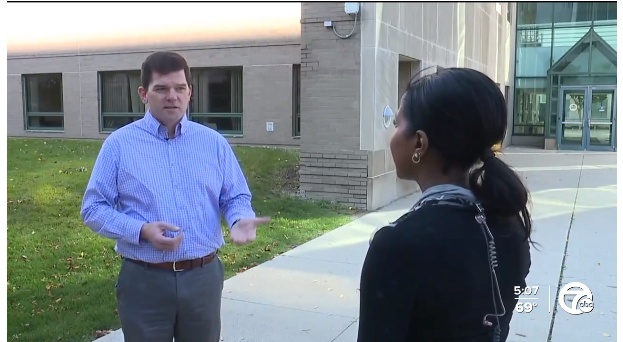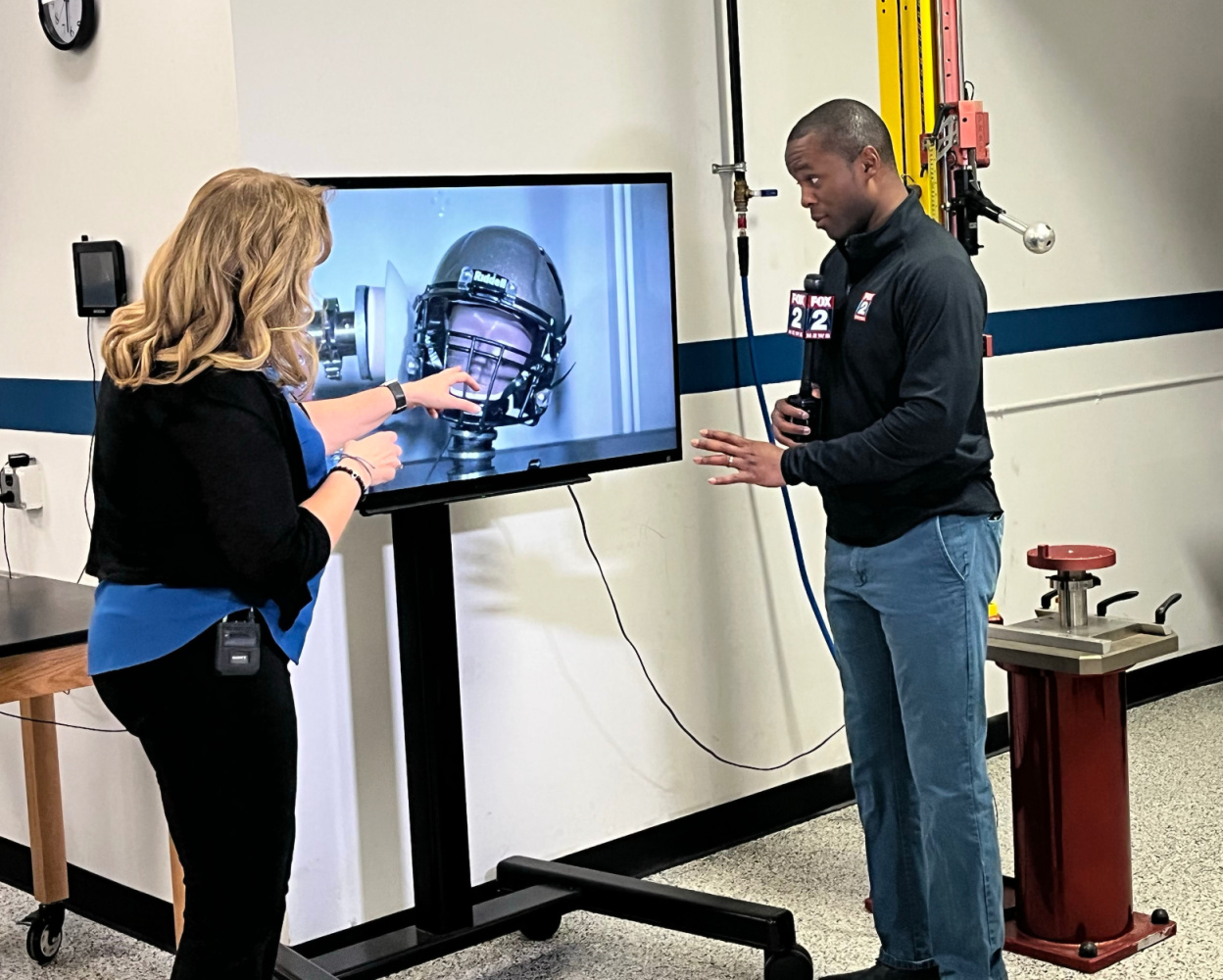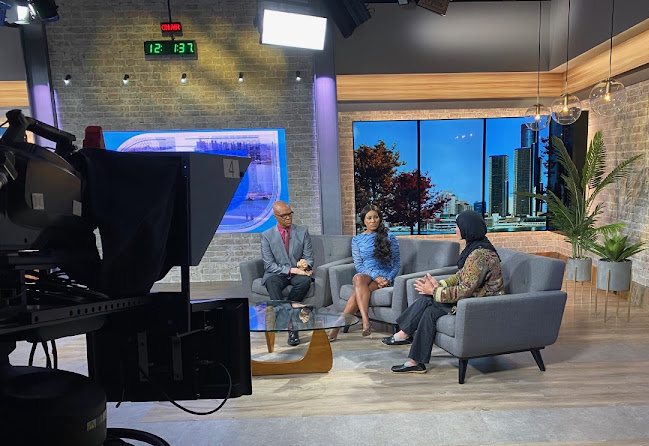Media training
Our team offers free, interactive and informative media training for faculty, staff and students. Participants receive an overview of the university's media and public relations policies, tips for interacting with the media, and one-on-one coaching in the form of mock interviews. Contact us to set up a training session.
Media Policy
As one of the nation’s leading public research institutions, Wayne State University has a unique opportunity to provide information and experts to the media on a wide range of topics. A positive relationship with the media can help educate the public, increase donor support and enhance WSU’s reputation in the community and around the world. The public relations team has a dual role in helping the media obtain the information it needs, while also acting as a resource for members of the WSU community who are called upon to act as spokespeople for the university. Any calls you receive from members of the media should be directed to the public relations team. We will evaluate the request and make arrangements for interviews and/or information dissemination. We also have a system for tracking placements and evaluating interest in WSU, which guides us in our public relations efforts.
If a reporter calls you on deadline, ask what the time frame is and request a call-back phone number and/or email address. For media concerns after 5 p.m. and on weekends, contact the public relations staff via cellphone. The staff is on call and available to assist anytime you have a media concern or opportunity.
Sharing news

Because Wayne State University is a comprehensive and diverse institution, some people in our surrounding communities and beyond may be unaware of all that happens here. Therefore, media interviews and placements present an opportunity to deliver key messages about various topics and educate reporters and the community about WSU’s unique offerings.
The key to any successful media interview is preparation. Below are some helpful starting tips. The public relations staff is available to help you whether you’re preparing for a talk show appearance, responding to a controversial topic, or serving as a spokesperson for your school or college. Please don’t hesitate to contact our office with questions, concerns or story ideas. We’re always looking to highlight positive news around campus.
How to be newsworthy
The media is more likely to cover your story if it has one or more of these elements:
- Uniqueness — Being the first or only organization in the city, region or nation to offer a program, make a medical discovery, etc.
- Numbers — The story must have the potential to affect a large number of people.
- Timeliness — The more recent the event or discovery, the better.
- Significance — A topic that is considered noteworthy by experts, or a local angle to a national topic in the news.
- Human interest — Hearing the story from a real person who experienced it, such as a research subject or a student, carries a lot of weight. Relatable, emotional appeal helps attract media attention.
Understanding journalists

Journalists are generally under tight deadlines. While some interviews may be scheduled days or weeks in advance, it is common to receive media requests that need to be filled the same day. It is important to be respectful of these deadlines and respond to requests as promptly as possible. If you don’t feel qualified to speak on a particular topic, suggesting another individual is very helpful to the reporter and our staff. We want you to have a comfortable experience working with journalists. Please keep the following points in mind when you are approached to be a source for a story:
- Any background, statistics, charts, etc. you can bring to an interview will be appreciated by reporters. Whenever possible, email or give them copies to refer to while writing and editing the story.
- Reporters are impressed when you are enthusiastic and well-spoken about your topic. They will make note of this and are likely to contact you again or welcome pitches on your behalf.
- Reporters — especially broadcast reporters — are usually pressed for time when conducting the interview. Please be on time for the interview, have notes and background information prepared, and give concise responses.
- Reporters may be aggressive in getting the story. If you are not providing the information they need, they may ask you straightforward questions to get the responses they are seeking.
- Most reporters covering WSU will likely have little or no experience in your area of expertise. This also is true of the audience viewing or reading your interview. Refrain from using technical terms and acronyms; keep the information simple.
Preparing for the interview
- Learn the topic of the reporter’s story and the information he or she is seeking. If there are potential areas of sensitivity, such as confidentiality or litigation, find out what information you are allowed to release.
- Think about the message you would like to express to your audience. Develop two or three key points to communicate.
- Complete any background work you might require to be fully informed on your topic.
- If you are participating in a television interview, think about ways the reporter can tell your story visually, rather than relying solely on your interview. This might include models, charts or video.

During the interview
- Relax and smile. Be conversational. Be yourself.
- Whenever possible, support your statements with hard facts or real-life examples. This gives you credibility in the eyes of the audience and makes what you are saying easier to understand.
- Keeping your statements concise will assist the reporter in editing your comments. Emphasizing your key points more than once will also help the reporter choose the most valuable pieces of information.
- If the reporter asks you a question you can’t answer or requires you to speculate on someone else’s position, don’t feel compelled to respond. Instead, move the conversation to the points you want to make. Say something such as, “While I can’t comment on that group’s decision, I personally believe ...” Never say, “No comment.”
- Nothing you say is off the record. Only share information with journalists that is public or that you’re comfortable with being aired or printed.
- If the reporter requires information you don’t have at your fingertips but can obtain, make sure you follow up to provide it quickly.
- After the interview, don’t ask to read the copy or see the tape before it runs. Many reporters view such requests as a challenge to their journalistic integrity and autonomy. It’s better to offer to be a resource if questions come up later.

Tips for TV and radio
- Look at the reporter — not the camera or a bystander — unless instructed otherwise. If it’s a phone interview, have a list of your key points.
- Body language is important. Avoid crossing your arms; gesturing appears more natural and open. Do not rock or swivel in your chair or fiddle with desk objects. This makes you appear nervous.
- If your interview is taped, it’s OK to stop and start again or rephrase a comment if it didn’t come out the way you intended. The reporter will appreciate having a clean sentence to use.
- Don’t ask a television reporter for a copy of the interview. Make arrangements to have a friend or family member record the broadcast if you can’t view it when it airs. The Office of Marketing and Communications also attempts to archive all WSU-related stories.
- Think about the interview setting. Choose a location that represents your topic well. For example, an interview on information technology would best be conducted in a computer lab. Using a background with WSU signage or a logo also is a good choice. The area should be without clutter, free of interruptions and well-lit.
- For television, carefully choose your clothing. Your attire should always be clean and neat. The following are additional suggestions for planning your television-appropriate wardrobe:
- Avoid wearing white or red. White glows and becomes the most noticeable thing on the TV screen. Red “bleeds” on camera and is distracting.
- Avoid wearing stripes, polka dots, intricate designs or flashy jewelry. They are hard for a TV camera to pick up on and are distracting.
- Remove jewelry that moves, makes noise or could hit your microphone.
Social Media
More and more journalists are turning to social media to craft news stories and learn about sources. Whether you maintain personal or official Wayne State social media accounts, there are a few things to keep in mind.
- Think twice before posting — no content on social media is truly private.
- Strive for accuracy and be respectful.
- Remember your audience: prospective students, current students, colleagues, peers and alumni.
- For personal accounts, identify your views as your own.
Complying with Michigan's Freedom of Information Act (FOIA)
As a publicly funded institution, Wayne State University must adhere to Michigan’s FOIA. A FOIA request is a request made to the university for the copy of a preexisting “public document” pursuant to the FOIA. Requesting individuals are entitled to receive copies of almost all university documents, with certain exceptions permitted by law. The determination that a document is not subject to FOIA requirements can be made only by the Office of the General Counsel. The FOIA does not require the university to create new documents or to answer questions; it requires only that the university provide copies of documents that already exist. For a request to be a FOIA request, the requestor must state that she/he is making a request pursuant to the FOIA. If you or your department receives a FOIA request, it is WSU’s policy to comply promptly. To ensure that requested records are public documents and that no privacy laws are violated, it also is the university’s policy that the Office of Communications is contacted if the request comes from the media. For more information about Wayne State’s FOIA policy, visit generalcounsel.wayne.edu/legal/foia.